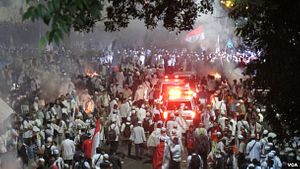If Jakarta’s hardline Islamists had set out to shut down the city in a show of force last weekend on December 2, they certainly fell short. Billed as a “reunion” of the Aksi Bela Islam 212 (Action to Defend Islam) demonstration a year earlier on the back of then-mounting calls for formal charges against Jakarta Governor Basuki “Ahok” Tjahaja Purnama for “blasphemous” comments made during the gubernatorial campaign, it failed to create the momentum of the initial event.
With much of the city apparently keen to leave the messy campaign behind, organizers have been accused of using the event for “political purposes.” Jakarta’s new governor, Anies Baswedan, came under fire for his involvement on the day after misleading the press over allowing the event to take place in the first place.
Baswedan had been forced to come clean to reporters the Thursday before the event, saying he had in fact given organizers permission to hold the rally at the iconic National Monument (Monas). Jakarta’s press pack had pelted him with questions throughout the week seeking clarification for who in the city government had green-lit the rally – a charge Baswedan had denied consistently up to and including Wednesday, November 29.
Upon further questioning, Baswedan confessed he had in fact given his approval in a letter issued November 24 in accordance to a new regulation he introduced overturning a ban on religious activities at the iconic meeting place in the center of the city, Detik reported. The governor was not further pressed to explain why he had repeatedly denied what is patently true.
Baswedan has previously been criticized for getting too close to hardline Islamist groups, particularly the Islamic Defenders Front (FPI), a relationship seen as legitimizing the group and its racial and religious intolerance. The then-candidate had attempted to distance himself from the FPI during the gubernatorial campaign last year after photos of him meeting firebrand cleric and group leader Habib Rizieq were circulated online, courting outrage.
But those concerns appear to have grown complicated for the governor, who accepted an invitation to attend the rally and give an address. While his speech touched on tolerance and respect for all Jakartans, Reni Suwarso, a political observer from University of Indonesia, told CNN Indonesia this is unlikely to be the last we see of the pairing. Baswedan’s attendance is a “political debt,” Suwarso said, and is necessary if he is to maintain at least a quiet civility with the FPI. It almost no longer matters how Baswedan feels about the group, Suwarso added; his teaming up with the group for his ultimately successful campaign means he will remain in debt lest the machine turn on his administration.
Supporters hoping for a repeat of the now infamous Baswedan and Habib Rizieq photos were left disappointed after the latter failed to appear. With the cleric currently in self-exile in Saudi Arabia in an effort to dodge pornography charges, rumors flew across Jakarta in November he would make a last minute appearance. Police were positioned near the Soekarno-Hatta Airport in the days prior to the rally just in case. Instead, the FPI’s most famous face delivered a recorded speech to the crowd in which he called on Indonesia to adopt a state ideology of Sharia law.
The call, apart from being absurdly unrealistic, underscores the waning influence of the FPI since the incarceration of Ahok earlier this year. A year ago, the 212 rally was a show of force, shutting down the city as millions flocked to protest against the “blasphemy” of Ahok. In retrospect, that event was the writing on the wall for Ahok and his supporters. But this year, a livestreamed message from the FPI leadership, a lukewarm speech from a governor keen to keep the movement at arms-length, and an unclear purpose beyond commemorating a year since the previous demonstration has the less devout wondering why they’re bothering.
Ironically, the complaint the 212 reunion rally was “too political” has dominated analysis in the week since. That Ahok has been in jail for nearly the whole year – one of the original reasons behind the 212 rally a year ago – did not go unnoticed. While the political class may be looking toward the 2019 elections already, many of those outraged by Ahok’s “blasphemous comments” made over a year ago clearly are not with organizers, who were unable to replicate the original 212 rally’s record-setting turn out.

































